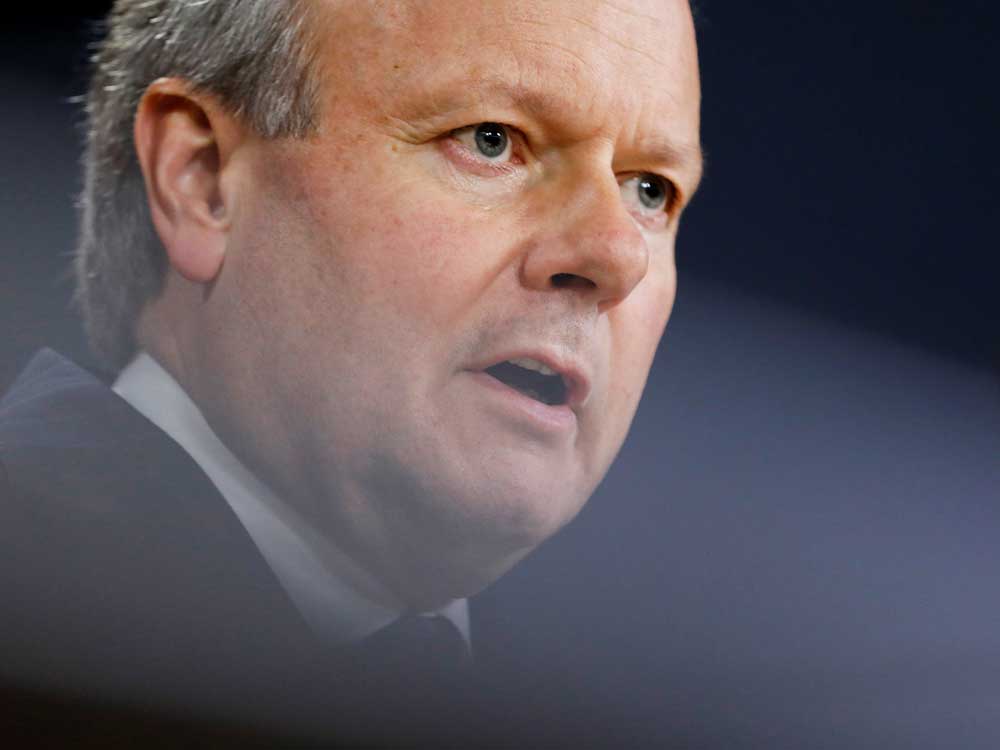Theory states that a big increase in the money supply will result in runaway prices, and there are those who are adamant that the hundreds of billions of dollars the Bank of Canada intends to create over the next year can only end in a rerun of the 1970s.
Government debt has a long association with inflation, so the Parliamentary Budget Officer’s April 30 forecast that debt will spike to about 50 per cent of gross domestic product in 2021 from about 30 per cent last year is making some people nervous.
The Consumer Price Index declined in April for the first time since the Great Recession. Nonetheless, anyone fearful of hyperinflation could use the Statistics Canada’s latest price survey to show what happens when too much money chases too few goods: the cost of cleaning products jumped 4.6 per cent from April 2019 and the paper supplies sub-index, which includes toilet paper, surged six per cent, the largest gain on record.
Stephen Poloz is seeking to allay those fears as he wraps up his tenure as Bank of Canada governor.
One point he likes to make is that policy-makers learn from their mistakes, so errors of the past won’t be repeated. He went so far as to tell the House finance committee last month that he would welcome inflation because upward price pressure would imply the economy was recovering from the COVID-19 recession.
Poloz, who will retire next week at the end of his seven-year term, also told the committee that central bankers know what to do when costs break free of the two-per-cent inflation target: raise interest rates. They are less confident about how you cleanly beat the opposite problem, which is why they have emptied the armory fighting the coronavirus crisis.
Deflation is the bigger threat during a severe recession, and central bankers struggled to eliminate the risk in the aftermath of the Great Recession. Weak price pressures were still an issue for the U.S. Federal Reserve and some other central banks ahead of the current downturn. Canada was one of the few major economies where inflation was comfortably on target.
In Poloz’s final speech as governor on May 25, he said the extraordinary policies he has overseen during the past few months were enacted to ensure the central bank will be in a position to guide the CPI back to two per cent as soon as the economy stabilizes.
Holding back because of the fear of eventually stoking inflation would only have made things worse. Debt would become an even bigger problem if deflation sets in because payments would take up a greater percentage of a smaller pool of revenue. Policy-makers decided they would rather tempt a showdown with inflation one day than get sucked into a deflationary spiral.
“Although a minority of observers worry that these extreme policies will create inflation someday, our dominant concern was with the downside risk and the possibility that deflation could emerge,” Poloz said in a speech that was supposed to be given at the University of Alberta in Edmonton, but was instead presented via videoconference from Ottawa.
“Deflation interacts horribly with existing debt, the two main ingredients of depressions in the past,” he continued. “In effect, then, we were saying that the downside risks were sufficiently dire that there were no relevant trade-offs for monetary policy-makers to consider. Picture the pandemic creating a giant deflationary crater in the middle of the economy; it takes what looks like inflationary policies to offset it.”
Poloz did a lot of the research that went into the Bank of Canada’s decision to introduce an inflation target in the early 1990s. Before that time, inflation was a feature of the economy since policy-makers were rarely able to successfully rein it in. But for the better part of two decades, inflation has been a non-story, with the CPI rarely straying far from year-over-year increases of two per cent.
That record of moderation could be tested once the economy recovers from the recession. A panel of experts assembled by the C.D. Howe Institute and led by David Dodge, a former Bank of Canada governor, on May 25 said the central bank and government should “reinforce their commitment” to the two-per-cent target.
“By doing so, the bank would retain ample latitude to increase its balance sheet over the next couple of years to support the economy and the financial system in a deflationary environment but provide assurance that it will promptly move to deal with any inflation that may emerge later,” the group said.
There is little reason to doubt the Bank of Canada’s commitment to its inflation mandate. Poloz said the economy will “need significant monetary stimulus in the rebuilding stage,” but that “it is well understood that the bank’s ability to lend without limit must be backed up by the inflation target to anchor inflation expectations.”
That said, Poloz is gone on June 3. One early challenge facing his replacement, Tiff Macklem, is ensuring that those observers who doubt the Bank of Canada’s ability to keep a lid on inflation remain a minority.
•Email: kcarmichael@postmedia.com |
